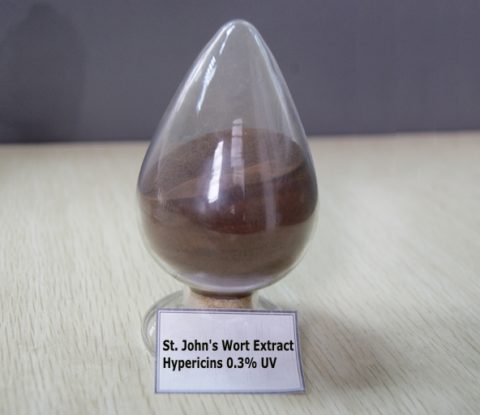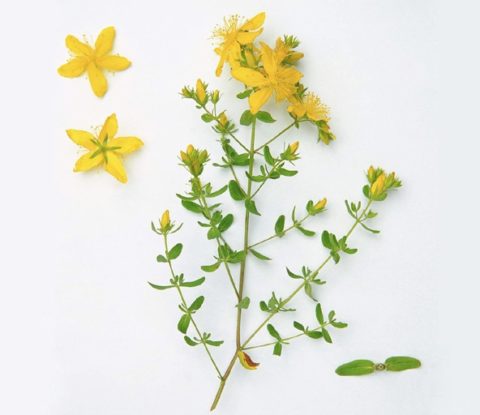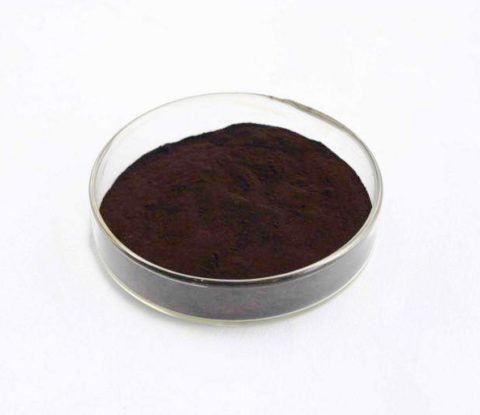
St. John’s Wort Extract
【Latin Name】: Hypericum perforatum
【Part Used】: Whole Herb
【Active ingredient】: Hypericins
【Specification】: Hypericins 0.3%
【Apperarance】: Brownish black fine powder
【Test Mothed】: UV
【CAS No.】: 548-04-9
【Molecular Formula】: C30H16O8
【Molecular Weight】: 504.45
【Particle size】: 100% pass 80 mesh
General Introduction
Hypericum perforatum, known as perforate St John’s-wort, common Saint John’s wort and St John’s wort, is a flowering plant in the family Hypericaceae. The common name “St John’s wort” may be used to refer to any species of the genus Hypericum. Therefore, Hypericum perforatum is sometimes called “common St John’s wort” or “perforate St John’s wort” in order to differentiate it. It is a medicinal herb with antidepressant activity and potent anti-inflammatory properties as an arachidonate 5-lipoxygenase inhibitor and COX-1 inhibitor.
St. John’s wort, similarly to other herbs, contains a whole host of different chemical constituents that may be pertinent to its therapeutic effects. Hyperforin and adhyperforin, two phloroglucinol constituents of St John’s wort, are TRPC6 receptor agonists and, consequently, they induce noncompetitive reuptake inhibition of monoamines (specifically, dopamine, norepinephrine, and serotonin), GABA, and glutamate when they activate this ion channel. In humans, the active ingredient hyperforin is also an inhibitor of PTGS1, arachidonate 5-lipoxygenase, SLCO1B1 and an inducer of cMOAT. Hyperforin is also a anti-inflammatory compound with anti-angiogenic, antibiotic, and neurotrophic properties. Hyperforin also has an antagonistic effect on NMDA receptors, a type of glutamate receptor. Moreover, St John’s wort is known to downregulate the β1 adrenoceptor and upregulate postsynaptic 5-HT1A and 5-HT2A receptors, both of which are a type of serotonin receptor. Other compounds may also play a role in St John’s wort’s antidepressant effects. Such compounds include: oligomeric procyanidines, flavonoids (quercetin), hypericin, and pseudohypericin.
Benefits of St. John’s Wort
1. Cures Depression
Depression can be crippling, preventing the sufferer from living a normal, happy life. Most anti-depressants used to treat this psychological problem come with a plethora of side effects. In such a scenario, it makes sense to turn to nature to find a cure. Research and studies in European countries have found that St. John’s wort works as a great herbal alternative to chemical laden anti-depressants. It can be used to treat mild to moderate depression. It has fewer side effects than many other antidepressants, and that is what makes it so popular in countries like USA.(1), (2)
Many studies show that St. John’s wort may help fight mild to moderate depression and anxiety and has fewer side effects than most other prescription antidepressants, such as loss of sex drive. However, it does interact with a number of medications, so it should be taken only under the guidance of a health care provider, especially if you already take medications for depression.
In many studies, St. John’s wort uses seem to work as well as selective serotonin reuptake inhibitors (SSRIs), a popular type of antidepressant that doctors often prescribe first to treat depression, such as Prozac, Celexa and Zoloft. According to the University of Maryland Medical Center, researchers aren’t exactly sure how St. John’s wort works; some have suggested that the herb acts similar to a SSRI because it makes more serotonin, dopamine and norepinephrine available in the brain. These neurotransmitters help improve your mood and can be responsible for treating symptoms of depression.
In studies using the rat forced swimming test, an animal model of depression, St John’s wort extracts induced a significant reduction of immobility. In other experimental models of depression, including acute and chronic forms of escape deficit induced by stressors, St John’s wort extract was shown to protect rats from the consequences of unavoidable stress.
St. John’s wort uses also include improving mood in people with SAD, a type of depression that occurs during the winter months because of lack of sunlight. SAD is usually treated with light therapy, and there is some evidence that using St. John’s wort together with phototherapy works even better as a way to beat the winter blues.
2. Menopausal Mood Swings
There are two distinct periods in feminine sexual health that can be challenging in terms of mood swings; pre-menstrual syndrome and menopause. St. John’s Wort is commonly recommended for women in both of these periods of their life, as the chemical constituents have been shown to reduce mood swings and anxiety in menopausal women, and also reduce the severity of cramping and pre-menstrual irritation and depression.(3)
St. John’s wort uses include being tested as an herbal remedy that relieves the psychological and vegetative symptoms of menopause. A study published in Advance in Therapy and performed in Berlin, investigated 12 weeks of treatment with St. John’s wort; 111 women, ages 43 to 65, took one 900 milligram tablet three times daily. All of the participants experienced symptoms characteristic of the pre- and postmenopausal state.
The treatment outcome was evaluated by the Menopause Rating Scale, a self-designed questionnaire for assessing sexuality, and the Clinical Global Impression scale. To test the results, the incidence and severity of typical psychological, psychosomatic and vasomotor symptoms were recorded after five, eight and 12 weeks of treatment. Substantial improvement in psychological and psychosomatic symptoms was observed, and menopausal complaints diminished or disappeared completely in 76 percent of the women; in addition to this, sexual well-being also improved after treatment, displaying that St. John’s wort uses include providing natural menopause relief.
3. Keeps Obsessive Compulsive Disorder (OCD) Under Control
People suffering from Obsessive Compulsive Disorder or OCD are often the ones dealing with anxiety. Often the butt of jokes, OCD sufferers rarely get their day out in the sun. St. John’s Wort does offer some relief from OCD symptoms, but they are insignificant.(4)
A study done at the Dean Foundation for Health Research and Education analyzed 12 patients who were diagnosed with OCD; the participants were treated for 12 weeks, with a fixed dose of 450 milligrams of 0.3 percent St. John’s wort twice daily. The study included weekly evaluations that were conducted with the Yale-Brown Obsessive Compulsive Scale, the Patient Global Impressions of Improvement Scale and the Clinical Global Impressions of Improvement scale, and a monthly evaluation with the Hamilton Rating Scale for Depression.
Significant changes occurred within one week and continued to increase throughout the trial. At the endpoint, five of the 12 patients were rated “much” or “very much improved” on the clinician-rated CGI, six were “minimally improved,” and one had “no change.” The most common side effects reported were diarrhea and restless sleep. Because improvement began at one week, and grew over time, researchers believe that St. John’s wort can be a helpful tool in treating OCD, and more placebo-controlled studies should take place in the future.
4. Other Mental Effects
This quality extends past depression, despite that being the most publicized benefit, to help people suffering from anxiety and mood swings as well. By helping to regulate the hormonal balance in the body, St. John’s Wort is able to get the metabolism and internal clock back in line, providing help for sleeplessness, irritability, and chronic fatigue. Removing chronic stress hormones from the body can also improve overall health and cognitive function, as excess stress hormones can permanently alter various organ systems.(5)
5. Alzheimer’s and Dementia
Swiss scientists published a novel study in the medical journal Brain Pathology, in which they found that St. John’s Wort has a protective effect against beta-amyloid plaques linked with Alzheimer’s disease.(6)
Application of St.John’s Wort Extract
1.Applied in food field, often used as additives, with distinct fragrance smell, it can promote digestion and increase appetite;
2.Applied in daily necessities field, aslo added into a large amount of oral cleaning products, such as dentifrices, mouthwash and tooth powder;
3.Applied in pharmaceutical field, because of the function of inhibition and paralysis to sensory nerve endings, it can be used as counter irritant.
References:
1. http://umm.edu/health/medical/altmed/herb/st-johns-wort
2. https://nccih.nih.gov/health/stjohnswort/sjw-and-depression.htm
3. https://en.wikipedia.org/wiki/Hypericum_perforatum
4. https://nccih.nih.gov/health/stjohnswort/sjw-and-depression.htm
5. http://patient.info/doctor/st-johns-wort
6. http://patient.info/doctor/st-johns-wort








